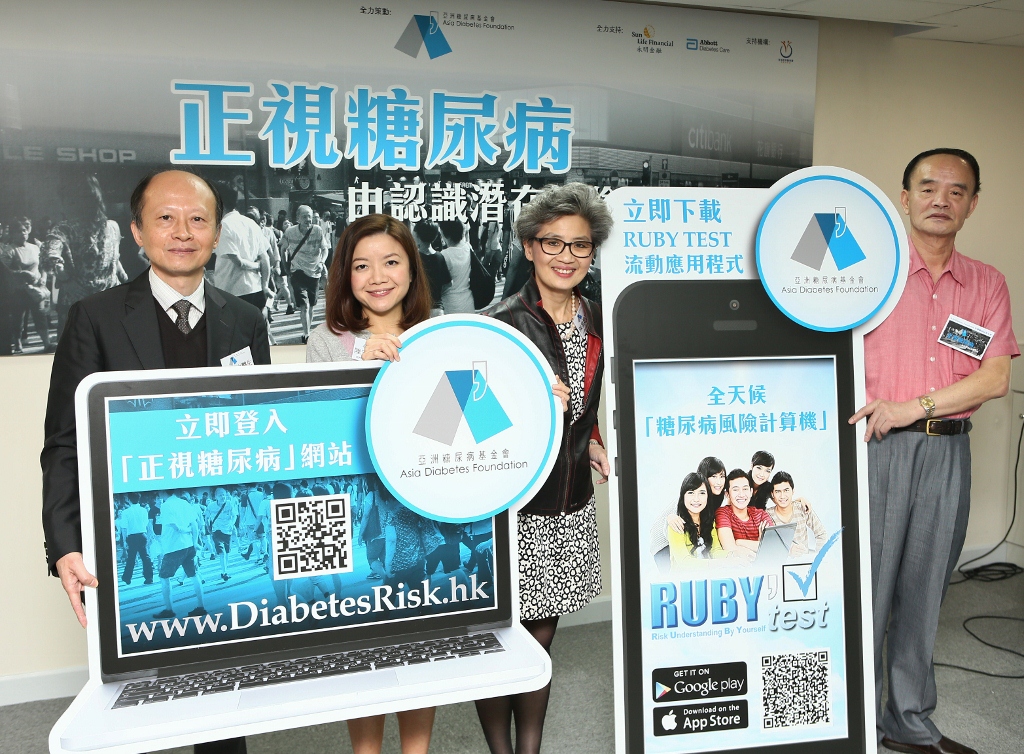Latest Public Poll Shows: A Severe Lack of Knowledge about High-Risk Factors and Complications of Diabetes among the Public in Hong Kong Experts Call for Facing the Warning Signs in the Prevention of Fatal Comorbidities
Every 6 seconds a person died from diabetes-related diseases around the world, and the figures from Hong Kong’s Department of Health indicates that diabetes is among the top 10 leading causes of fatal disease locally . According to the data from the Hong Kong Diabetes Registry, about 1% of diabetes patients results in death every year . 2 to 3% of people with diabetes also exhibit serious complications such as heart disease, renal failure, stroke, and cancer. If diabetes is not treated properly, it will have profound effects on the body which may lead to death. Generally, there is a lack of disease awareness in facing diabetes squarely among the public, as almost half of the individuals known to have the condition without realising it. Most patients seek medical attention only when severe complications emerge, hence missing the optimum opportunity for regaining control of and reversing the condition for themselves.
This year, the Centre for Communication and Public Opinion Survey at the Chinese University of Hong Kong, commissioned by Asia Diabetes Foundation (abbreviated to ‘Foundation’) to conduct a telephone survey, namely ‘Perceptions of public towards Diabetes in Hong Kong’, to probe deeply into how the disease is being perceived by the public in Hong Kong. The survey reveals that a vast majority of respondents expressed no keenness in acquiring a thorough understanding of the factors that confer high risks of developing diabetes and its complications, thus impeding disease prevention in high-risk individuals.
For this reason, Foundation is launching ‘Prevent the Preventable’ website (www.DiabetesRisk.hk) to provide comprehensive information about diabetes, including the symptoms, complications, treatment and prevention. In addition, the organisation has developed a mobile application ‘Diabetes Risk Calculator’ Risk Understanding By Yourself (RUBY Test) along with the website by employing evidence-based research. The ultimate aim is to raise diabetes awareness in the public domain and to allow closer control of self-monitoring system. By assisting the public to face the underlying diabetes risks therefore early detection and treatment, this will help people in Hong Kong to lead a healthy life.
Study shows scanty knowledge about risk factors and complications of diabetes among Hong Kong population.
The ‘Perceptions of public towards Diabetes in Hong Kong’ telephone survey conducted from September to October this year has successfully interviewed 1,019 Hong Kong citizens aged 18 or above. The survey was conducted through random sampling in order to understand how the public perceived diabetes with aspects including the causes, risks, and complications of diabetes.
Study findings show that:
1. Respondents show lack of knowledge on the 4 main contributing factors to diabetes in general
The 4 main risk factors contributing to diabetes are obesity, unbalanced diet, physical inactivity and a family history of diabetes. However, it is found that only less than 20% of respondents could correctly point out that obesity (13%) and physical inactivity (18%) as the main causes of diabetes in this survey. Likewise, less than 30% could indicate family history of diabetes as the leading cause of diabetes (26.4%), and about a quarter of respondents expressed directly that they ‘do not know’ the causes of the disease.
Although 76% of respondents self-admitted as being healthy, over 60% of them were not tested for blood glucose level in the past year (61.2%), with more than half (54%) did not carry out sessions of exercise of 30 minutes or more, at least 3 times a week.
In view of the above results, Prof. Juliana Chung Ngor Chan, Chief Executive Officer of Asia Diabetes Foundation, said, “One in every 10 persons in Hong Kong has diabetes and this affects a significant amount of people. Yet, results from the survey indicated that most people have a lack of basic understanding about the disease, as most respondents did not monitor blood glucose level. This reflects how people in Hong Kong are belittling the risks of diabetes which can potentially elevate the risk in developing diabetes in high-risk individuals.”
2. Most respondents disregarded the consequences of diabetes
According to the statistical data from international source, 1 person died from diabetes-related diseases every 6 seconds globally, with common chronic comorbidities such as heart disease, stroke, blindness, renal failure and amputation.
Based on the findings from this survey, however, about a quarter of respondents (22.9%) shows no conceptions in complications of diabetes (by answering ‘do not know’). In addition, less than one-fifth of respondents realised that diabetes can lead to complications of the heart (20%), kidney (13%) and brain (10%), and only less than half of respondents can correctly indicated the two terms that are already linked with the complications in relation to diabetes, which were ‘diabetic retinopathy‘ (45%) and ‘diabetic foot’ (49%). Moreover, pre-diabetes was unheard of in almost 60% of people.
Prof. Chan pointed out that, “According to the latest figure, 1 in every 2 persons has pre-diabetes . 15-30% of these pre-diabetics will develop into type 2 diabetes in 5 years , with a 40% higher cardiovascular risk than healthy ones . Being a systemic disease, diabetes can have serious impacts on different organs such as the eyes, kidney, heart and blood vessels. Nonetheless, the condition of diabetes could possibly be reversed given that the risks are detected and evaluated early enough, with proper follow-up and adhering to a healthy diet and living habits. All of which attenuate the risks of developing complications remarkably”.
Foundation launched ‘Prevent the Preventable’ website to guide and understand accurate diabetes risks
Since people in Hong Kong have limited understanding of diabetes, most patients seek medical attention only when severe complications emerge. It is attributable to the lack of perception in autonomous self-management and neglecting the underlying risks, and hence missing the optimum opportunity for regaining control and reversing the condition for themselves. In response to the need of this, the Foundation has exclusively launched the website- ‘Prevent the Preventable’ (www.DiabetesRisk.hk) which is comprised of ‘Understanding Diabetes’- an introduction to the causes, risk factors, symptoms and chronic comorbidities of the disease; ‘Living with Diabetes’- treatment regimen and autonomous self-management information of diabetes; ‘Identify Unrecognised Pre-diabetes’- understanding the early risks of pre-diabetes; and ‘Healthy Living Resources’- providing recommendations to live healthily and to encourage the community to face diabetes squarely.
The Foundation has also designed a mobile application ‘Diabetes Risk Calculator’ (RUBY Test) by integrating evidence-based research into it. By answering approximately 20 questions with basic information, for instance, age, weight and height, waist circumference, medical history, family history and lifestyle, user will receive an instant diabetes risk score accordingly. The score serves to remind high risk individuals to seek immediate advice from medical professionals and to undergo diagnostic tests through specific, concrete health tips. Changes in the diet and lifestyle are also recommended in prevention of disease development. The mobile application will save the risk score in the system concurrently to provide a user-friendly experience in tracking the trend of diabetes risk of the user.
Dr. Andrea On Yan Luk, Deputy Medical Director of Asia Diabetes Foundation explained, ‘Type 2 diabetes is in fact preventable and controllable. We can definitely regain control of our own health through self-detection to understand whether we are potentially at high-risk of diabetes. As the risk varies according to time, health condition and lifestyle, it is recommended that public should be assessed every 6 months by utilising ‘Diabetes Risk Calculator’. Once the risk score raises, people should immediately seek help from doctors and take blood tests and other diagnostic examinations targeted for diabetes, in conjunction with a diet that aims at ‘three lows and one high’, as well as to maintain moderate level of physical activity in order to prevent diabetes.
To nip diabetes in the bud, one should login to ‘Prevent the Preventable’ website (www.DiabetesRisk.hk), or download the mobile application ‘Diabetes Risk Calculator’ (RUBY Test) to find out if you hold any of these risk factors to diabetes and lower your odds of getting the disease by taking blood tests and monitor blood glucose regularly.
References
1 IDF Diabetes Atlas. (Sixth Edition). 2013. The International Diabetes Federation.
2 Number of Deaths by Leading Causes of Death, 2001 – 2013. Centre for Health Protection. Department of Health. URL: http://www.chp.gov.hk/en/data/4/10/27/380.html. Retrieved on 31 Oct 2014.
3 So WY, et al. Diabetes/metabolism research and reviews. 2008;24:238-246.
4 Luk AO, et al. Diabetes/metabolism research and reviews. 2013;29:384-390.
5 Chan JCN, et al. Curr Cardiovasc Risk Rep. 2011;5:230-239.
6 Smart Patient. Hospital Authority. URL: http://www21.ha.org.hk/smartpatient/en/chronicdiseases_zone/details.html?id=98. Retrieved on 31 Oct 2014.
7 Xu Y, et al. JAMA. 2013;310(9):948-958.
8 Prediabetes. Centers for Disease Control and Prevention website. URL: http://www.cdc.gov/diabetes/basics/prediabetes.html. Retrieved on 10 Nov 2014.
9 Selvin E, et al. Circulation. 2014;130(16):1374-82.


